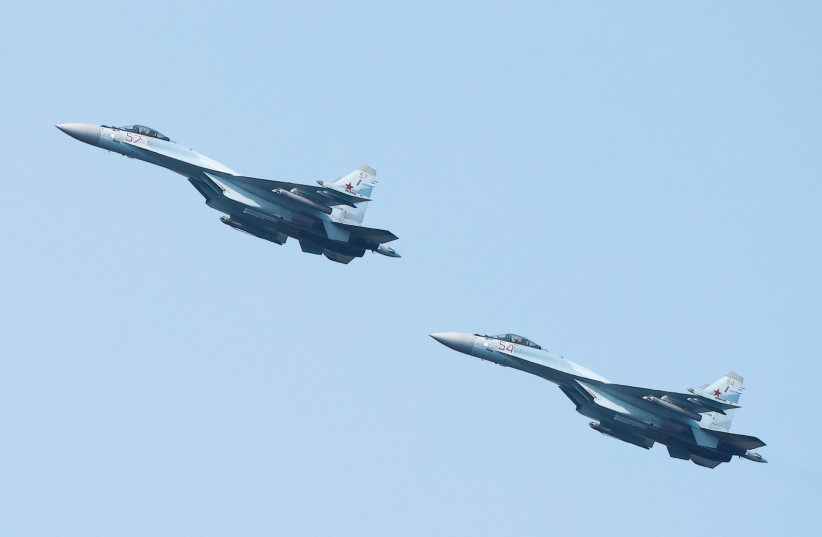Iran sought to get universities in the UK to help with its drone program and other military technology, according to a report in the Jewish Chronicle. According to the report “senior MPs and peers expressed deep concern over the findings, with a government spokesperson saying Britain would ‘not accept collaborations which compromise our national security.’” This is an important report and it has been confirmed by other reporting. Eleven universities are accused of being involved and at least 16 studies may have aided Iran.
It comes as the US has also recently said that Russia and Iran are increasing defense cooperation. “Russia has been using Iranian UAVs in recent weeks to strike Kyiv and terrorize the Ukrainian population, and the Russia-Iran military partnership appears to be deepening,” White House spokesman John Kirby said in a statement. At the same time French President Emmanuel Macron has also mentioned the Iranian drone supplies to Russia in a recent conversation with Iran’s president.
The report about the universities being involved, perhaps inadvertently, in aiding Iran’s deadly drone program, shows how Iran exploits loopholes in the West to not only get around sanctions but to feed off Western expertise. Iran brags that its drone and missile programs are indigenous and it is proud that it has built new drones and missiles in recent years. However, Iran does rely on components sometimes produced in the West or reverse-engineered and produced locally or even in places like China. Iran’s drones have been revealed to have pieces from all over the world and this has led to controversy in Western countries when it is shown that seemingly normal pieces of technology are ending up on drones used to terrorize Ukraine. Now we know how long the tail of Iran’s supply logistics line stretches.
In one case mentioned by the article in the Chronicle, a researcher allegedly looked into “upgrading the lightweight, two-stroke engines used to power drones, including its HESA Shahed 136, which is being used by Russia to attack Ukrainian targets.” The full extent of how Iran has sought to feed off the West to help its drone program may never be known. Clearly, there was an era during the Iran deal when it was easier for people to work with Iranian colleagues and universities even on things that seem to have military applications and pretend that it was part of the West’s overall policies.
Iran sending drones to Russia
Now, with Iran sending drones to Russia, it is clear that Iran’s military-industrial complex is not merely an innocent institution that “only” threatens the Middle East. Among the universities in Iran that were mentioned in the article at the Chronicle as being linked to the UK were the Shahrood University of Technology and Ferdowsi University of Mashhad as well as the Iranian University of Science and Technology, Tehran. “Based on an analysis of thousands of papers published in scientific journals since 2017, the JC has unearthed hundreds of projects in which British academics and institutions have collaborated with Iranian universities that have been sanctioned due to their involvement with its nuclear programme,” the article said.

The context here is that Iran has sought often through nefarious means to penetrate the West. It does this by using shell companies and trying to acquire “dual use” technology, and it apparently also tries to penetrate institutions of higher learning. This penetration is likely deeper in other countries as well. It’s important to remember that it wasn’t long ago that Iranian regime members such as Javad Zarif, the foreign minister, were welcomed in the West with smiles and handshakes. Iran’s Mahmoud Ahmadinejad even delivered a speech at Columbia University in 2007, despite his hateful conduct and Holocaust denial.
It is difficult in retrospect to see Western universities as being entirely at fault when Western governments were doing outreach to Iran. The fact that some universities apparently didn’t mind having a Holocaust-denying Iranian regime leader speak would indicate that having academics partner with colleagues in Iran would not seem out of the normal several years ago. That Iran exploited this to try to get insights into how to develop their drone program is shocking, but also in line with how Iran tries to exploit the West.
Tehran has done this for years, and it is now getting a stronger spotlight precisely because the drones that Iran has built are being used to threaten more areas and countries. In the past Iran used its drones to target Saudi Arabia and Israel and it exported the technology to Hezbollah and militias in Iraq, Syria, and Yemen. The drones did get some spotlight by groups such as Conflict Armament Research and the US even put some on display at Joint Base Anacostia-Bolling. This means that in some areas, including at the UN, the Iranian drone proliferation has been known for almost a decade.
On the other hand, Iran is also very creative in finding ways to get around sanctions and build the motors and other elements necessary for the drones. Attempts to continue to slap sanctions on the drone manufacturers, the transporters and other elements of the program merely reveal how extensive is the Iranian killer drone network.
The West continues to highlight the program and discover new ways to sanction it; and Ukraine has also been raising the alarm about Iran’s drones. Nevertheless the recent reports about the universities shows how even the most seemingly innocent academic setting can be infiltrated by Iran’s regime and exploited.
